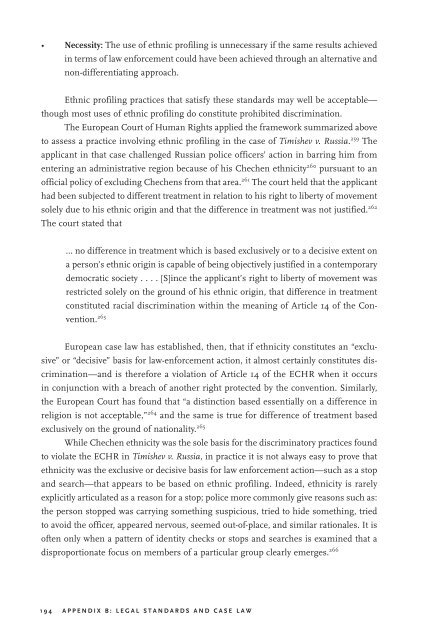Reducing Ethnic Profiling in the European Union - Open Society ...
Reducing Ethnic Profiling in the European Union - Open Society ...
Reducing Ethnic Profiling in the European Union - Open Society ...
- No tags were found...
Create successful ePaper yourself
Turn your PDF publications into a flip-book with our unique Google optimized e-Paper software.
• Necessity: The use of ethnic profil<strong>in</strong>g is unnecessary if <strong>the</strong> same results achieved<strong>in</strong> terms of law enforcement could have been achieved through an alternative andnon-differentiat<strong>in</strong>g approach.<strong>Ethnic</strong> profil<strong>in</strong>g practices that satisfy <strong>the</strong>se standards may well be acceptable—though most uses of ethnic profil<strong>in</strong>g do constitute prohibited discrim<strong>in</strong>ation.The <strong>European</strong> Court of Human Rights applied <strong>the</strong> framework summarized aboveto assess a practice <strong>in</strong>volv<strong>in</strong>g ethnic profil<strong>in</strong>g <strong>in</strong> <strong>the</strong> case of Timishev v. Russia. 259 Theapplicant <strong>in</strong> that case challenged Russian police officers’ action <strong>in</strong> barr<strong>in</strong>g him fromenter<strong>in</strong>g an adm<strong>in</strong>istrative region because of his Chechen ethnicity 260 pursuant to anofficial policy of exclud<strong>in</strong>g Chechens from that area. 261 The court held that <strong>the</strong> applicanthad been subjected to different treatment <strong>in</strong> relation to his right to liberty of movementsolely due to his ethnic orig<strong>in</strong> and that <strong>the</strong> difference <strong>in</strong> treatment was not justified. 262The court stated that… no difference <strong>in</strong> treatment which is based exclusively or to a decisive extent ona person’s ethnic orig<strong>in</strong> is capable of be<strong>in</strong>g objectively justified <strong>in</strong> a contemporarydemocratic society . . . . [S]<strong>in</strong>ce <strong>the</strong> applicant’s right to liberty of movement wasrestricted solely on <strong>the</strong> ground of his ethnic orig<strong>in</strong>, that difference <strong>in</strong> treatmentconstituted racial discrim<strong>in</strong>ation with<strong>in</strong> <strong>the</strong> mean<strong>in</strong>g of Article 14 of <strong>the</strong> Convention.263<strong>European</strong> case law has established, <strong>the</strong>n, that if ethnicity constitutes an “exclusive”or “decisive” basis for law-enforcement action, it almost certa<strong>in</strong>ly constitutes discrim<strong>in</strong>ation—andis <strong>the</strong>refore a violation of Article 14 of <strong>the</strong> ECHR when it occurs<strong>in</strong> conjunction with a breach of ano<strong>the</strong>r right protected by <strong>the</strong> convention. Similarly,<strong>the</strong> <strong>European</strong> Court has found that “a dist<strong>in</strong>ction based essentially on a difference <strong>in</strong>religion is not acceptable,” 264 and <strong>the</strong> same is true for difference of treatment basedexclusively on <strong>the</strong> ground of nationality. 265While Chechen ethnicity was <strong>the</strong> sole basis for <strong>the</strong> discrim<strong>in</strong>atory practices foundto violate <strong>the</strong> ECHR <strong>in</strong> Timishev v. Russia, <strong>in</strong> practice it is not always easy to prove thatethnicity was <strong>the</strong> exclusive or decisive basis for law enforcement action—such as a stopand search—that appears to be based on ethnic profil<strong>in</strong>g. Indeed, ethnicity is rarelyexplicitly articulated as a reason for a stop; police more commonly give reasons such as:<strong>the</strong> person stopped was carry<strong>in</strong>g someth<strong>in</strong>g suspicious, tried to hide someth<strong>in</strong>g, triedto avoid <strong>the</strong> officer, appeared nervous, seemed out-of-place, and similar rationales. It isoften only when a pattern of identity checks or stops and searches is exam<strong>in</strong>ed that adisproportionate focus on members of a particular group clearly emerges. 266194 APPENDIX B: LEGAL STANDARDS AND CASE LAW
















